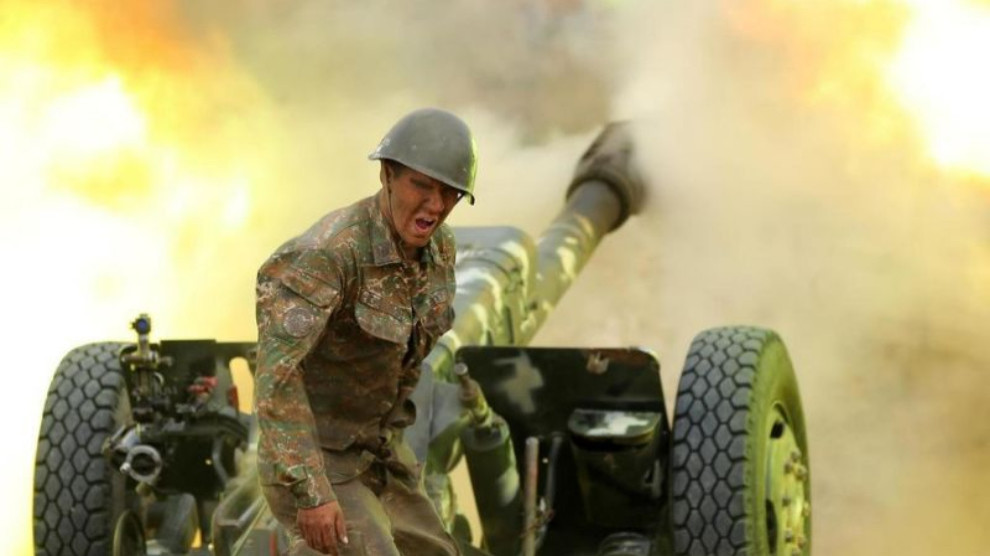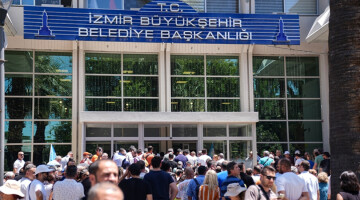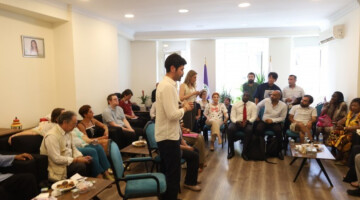The fighting in the Artsakh region (Nagorno-Karabakh), which is inhabited mainly by Armenians, has intensified since its outbreak on September 27. Turkey is providing military support to Azerbaijan in asserting its claims to the region of the Aliyev regime in Baku. Jihadists who have been brought to Azerbaijan from Syria by Turkey are also taking part in the fighting. The region in the South Caucasus was also inhabited by Kurds in the past: Red Kurdistan - Kurdistana Sor, as the autonomous province in the former USSR was called, which existed from 1923 to 1929, was located between Artsakh and Sjunik, the southeasternmost province of Armenia.
The area was settled by Kurdish tribes in the 18th century. In the years 1937/38, parallel to the genocide of the Alevi Kurds in Dersim and about ten years after the dissolution of Kurdistana Sor by a decision of the Azerbaijani Soviet Congress, most of the Kurdish inhabitants were deported. With the dissolution of the USSR, the Artsakh region declared its independence from Azerbaijan on December 10, 1991. This marked the beginning of fierce fighting between the two states, which lasted until 1994. To resolve the conflict, the OSCE created the Minsk Group in 1994 under the co-chairmanship of Russia, the United States and France. De facto, Artsakh has been under Armenian control ever since. Since 1994, the fighting has flared up again and again despite the ceasefire.
Continuation of the Armenian genocide
In an interview with ANF, Silo Dirboyan, co-chair of the Kurdistan Committee in the Armenian capital Yerevan, commented on the current escalation. According to Dirboyan, Turkey is now officially a warring party in the conflict between Armenia and Azerbaijan. Dirboyan sees the Turkish state's attacks on Artsakh as a "continuation of the Armenian genocide of 1915”. He says that just as the Turkish state occupies or tries to occupy areas in Kurdistan, Syria, Iraq and Libya, it has the same ambitions in the Caucasus.
A Turanist offensive
Dirboyan connects Turkish participation in the war in Artsakh with the Pan-Turkish racist Turanist ideology and sees the war effort as "first steps on the map in the sense of Turanism”. Turanism is about the creation of a great empire of "Turk states" under the rule of an imagined "Turkish race". Turanism is strongly imbued with German Nazi ideology and represents the biological-racist counterpart to Neo-Ottoman expansionism, which is based primarily on pan-Islamism.
"The venue of the war of the great powers in the Mediterranean, Libya and North Africa should be shifted somewhat to the Caucasus. When Armenia did not find the hoped-for Russian support, the war intensified," Dirboyan says.
Silence of Russia
When asked about Russia's failure to react, Dirboyan answers: "There are various comments on this. For example, it is said that Russia is trying to determine the real forces behind the attacks. But there are also worst-case scenarios in which it is assumed that Russia has given up Artsakh for any concessions. This scenario would be very damaging to Russia, because the Turkish state has always kept the Turanist idea alive. If Turkey is successful in Artsakh, it will try to extend this scenario to the other Turkic states."
Mercenary troops from Syria have already started plundering
Dirboyan warns that the jihadists from Syria could become "a calamity" especially for the Azerbaijani people. The groups have already started looting, he says and continues: "In the places where the mercenaries are currently located, the looting is already underway. They have broken into the houses and stores of the people and stolen the people's property. They are basically doing the same thing here as in Afrin, Serêkaniyê and Girê Spî."
Preparation of a possible offensive against Iran?
Dirboyan points out that the mercenary troops were mainly stationed in areas along the Iranian border. He fears that this concentration of troops could lead to preparations for a possible offensive against Iran.
Regarding the military situation on the ground, Dirboyan says that the Armenian side has not yet lost any positions and has even advanced at some points. In some places along the front the inhabitants had to be evacuated for security reasons. There is a mood of unity among the Armenian populatioin and there is also a great mobilisation in the diaspora.”
Regarding the relationship between the peoples, Dirboyan tells: "We live here together with the Armenian people. But we also have Kurds in Azerbaijan. This war is not a war of the peoples, but one that is forced upon them by the rulers. The rulers are trying to make the peoples enemies. We as Kurds in Armenia are on the side of the Armenian people. Many Kurds fight here also in the army. With the intervention of Turkey, we also see the war as an attack against us.”
"In 2016, Kurdish soldier beheaded"
The Kurdish and Armenian people should not repeat the mistakes of the past, Dirboyan warns and notes that Turkey's hostility towards the two peoples knows "no borders". He also recalls Kurdish soldier Kerem Siloyan, who was beheaded in Artsakh in 2016: "In this war at that time, Turkish soldiers also supported the Azerbaijani military. Yazidi Kurd Kerem Siloyan fought in the Armenian army. His fight went on to the last bullet. After that Turkish soldiers entered the area, later they presented themselves in pictures with his head cut off. We know very well the historical enmity of the Turkish state.”
RELATED NEWS:














